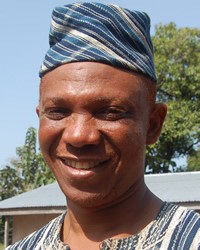Gonja in Ghana

Photo Source:
Anonymous
|
Send Joshua Project a map of this people group.
|
| People Name: | Gonja |
| Country: | Ghana |
| 10/40 Window: | No |
| Population: | 426,000 |
| World Population: | 426,000 |
| Primary Language: | Gonja |
| Primary Religion: | Islam |
| Christian Adherents: | 0.60 % |
| Evangelicals: | 0.50 % |
| Scripture: | Complete Bible |
| Ministry Resources: | Yes |
| Jesus Film: | Yes |
| Audio Recordings: | Yes |
| People Cluster: | Guinean |
| Affinity Bloc: | Sub-Saharan Peoples |
| Progress Level: |
|
Introduction / History
The Gonja people reside in northern Ghana, with some communities also found in Togo. Originally, they migrated from the Hausa tribe of Nigeria. The people speak the Gonja language, which belongs to the Guang branch of the Niger-Congo language family. Their language is rich in proverbs, stories, and songs, which play a vital role in passing down their cultural heritage.
What Are Their Lives Like?
The Gonja people are predominantly petty farmers and traders. Women play a vital role in childcare and education, often taking responsibility for paying their children's school fees. Charcoal burning is a significant economic activity for women, which they engage in throughout the year to sell in markets. The Gonja people cultivate maize, yams, and sorghum, relying on donkeys as their primary mode of transportation. They also raise cattle, sheep and goats.
A strong sense of community and respect for tradition characterizes Gonja culture. They place great emphasis on hospitality, generosity and cooperation. Their traditional clothing, music and dance are also essential components of their cultural identity. The Gonja people celebrate various festivals throughout the year, which often coincide with important agricultural events or Islamic holidays.
Gonja society is organized around a complex system of clans, lineages and family ties. Their traditional leadership structure is based on a council of elders who make decisions for the community. This system is still revered today, with many Gonja communities maintaining strong ties to their traditional leaders.
What Are Their Beliefs?
Over half are Muslim, and the number of Christians is barely negligible. As Muslims, they depend on the teachings of the Koran as presented by religious leaders. They were attracted to Islam because of the promised healing powers and the power of Islamic prayers. Others were attracted for economic reasons; Islam offered trade opportunities with Arab traders.
What Are Their Needs?
The Gonjas need to understand that Jesus answers prayers and gives us true guidance through life s difficulties.
Prayer Points
Pray that the Gonja people will be receptive to outsiders establishing schools in their communities.
Pray for spiritual illumination, that their eyes will be opened to the truth of God's word.
Pray for the raising of disciples among the Gonja people, whose hearts have been hardened to the gospel.
Pray that Gonja men will recognize their responsibilities and begin to care for their wives and children.